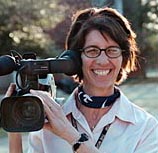The first time I looked for a job in television was in 1974. I had a lot of trouble getting an interview. I was interested in doing technical work, but the station managers and operations directors were not interested in me. "You have to hang lights, and the tech crews use bad language," I was told at WGBH in Boston, by a manager who would not accept my application to work as a stagehand. He was not going to consider a female for that job. I got luckier across town at WCVB, which had just bought Channel 5, and was waiting for FCC approval of its license. The management was pretty much at the mercy of the IBEW (The International Brotherhood of Electrical Workers) broadcast union, because it needed to show that it was staffed with competent technicians. The contract specified that there would be a camera assistant for some of the TV news crews, and I got hired as one such assistant. Known as a "lumper," I carried equipment for the cameramen. I joined the union, and started at $86 a week. The same contract that created a job where I could learn the trade, also prevented me from using audio, lighting or camera equipment. I had to find cameramen who would cheat and let me break the contract so I could learn something other than how to lift a Colortran kit. In the next negotiation, the camera equipment was deemed lighter and less bulky, and the lumpers were "sacrificed." Since we were all minority hires--or affirmative action--the station had to provide us with a few months of training before getting rid of us. For the next 20 years, I belonged to the broadcast unions. I made a good hourly wage, I was paid overtime, and my assignment editors thought twice before asking me to skip lunch - otherwise they would have to pay a "meal penalty." In exchange, I paid my union dues and agreed to the work rules. The union wage prevailed in the 1970s and '80s. NABET (National Association of Broadcast Engineers and Technicians) represented staff workers, and did little for its small number of freelance members. But by the '90s, unions like NABET had begun to represent a large freelance pool. The networks live by the freelancers, who shoot an enormous percentage of the newsmagazine shows. Production managers and assignment editors, some of whom belong to the union, know that many of the best broadcast crews are union. The production of programming for cable and new media, however, has no tradition of union organization. An enormous amount of television is shot faster, cheaper and quicker than ever before. TV executives want broadcast quality at lower and lower prices. Some are able to achieve this, while others are satisfied with cheaper productions, and donít really care about quality. The men and women who produce, direct, shoot and edit the cable shows are the same ones who shoot for broadcast. The picture now shapes up like this: why should the networks - who lose a piece of the audience every year - pay more money and provide benefits for the people who do essentially the same thing for the competition at a lower wage, no benefits, and no work rules. Because the networks can afford it? (Insert laughter here.)
In the past week, Iíve talked with a couple of people at ABC News, and a few who are locked out. This came from management at 20/20: These people are our friends. It's a lousy situation. We'd like them to work. They shouldn't be out on the street. The rank and file want to work. This is from a freelance producer inside one of the bureaus: Iím doing what I always do for ABC--gather elements, not union work. We donít drive through the picket line in their cars with their equipment. That would be rubbing salt in the wounds. We hire a production company, and we meet them. No one is mad at the unionÖI need the work. I am not personally involved in the lockout, because Iím working at a tiny UHF station, with a small paid staff and a handful of college interns. On Fridays, our 5 oíclock news program is directed by a very talented technical director--she's a teenager. To a locked-out NABET member, I suggested he jump across the crack that has opened in the television universe. Yes, itís been nice working for a great wage, itís been swell being paid for all those hours, all those travel days, all those missed meals and short turnarounds. But itís an encrusted past, and industry veterans will have to adapt to the change. The locked out picketer replied: Animosity or no animosity, a lockout, a strike, a layoff - these are traumatic events for those suddenly out on the street. I've used your line, with attribution, about the crack that has opened in the television universe. I had a meeting with a head of a production company last week that represents precisely that other side of the divide. Busy, expanding, low budget, but full of new technology and new talent. I have a meeting today with another of these cable content subcontractors. It has been a new day for some while now. I hope I'm waking up in time. ------------------- For more information on the labor dispute, check out the NABET website at http://www.nabet31.org The home page for ABC News is http://www.abcnews.com
 Amy Bowers
|
